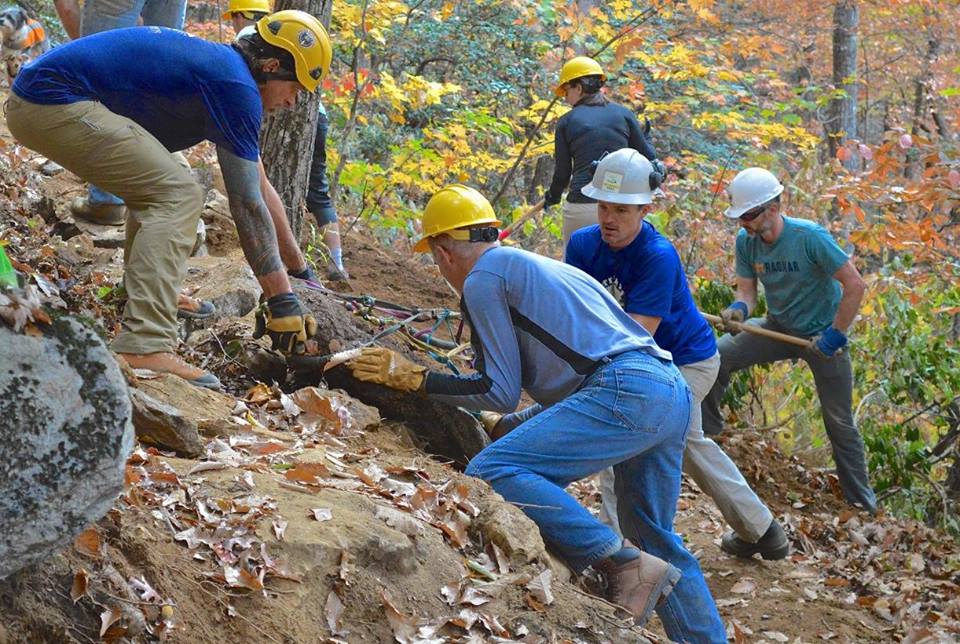Here’s an opportunity to spend a day in the woods, break a sweat and show some love for our beautiful forestlands: the inaugural Pisgah Pride Mega Work Day.
Sponsored by the Pisgah Conservancy, with broad support from trail clubs, businesses, nonprofits and individuals dedicated to maintaining the vitality of Pisgah National Forest, Pisgah Pride Day is a large-scale volunteer work project meant to coincide with National Public Lands Day on Saturday, Sept. 24. The event is an open call to both experienced trail builders and first-time volunteers to gather in the Pisgah Ranger District for a day of service. Volunteers will document and remove invasive plant species, trim brush, repair trails, polish signs, remove trash and more.
Lending a hand — and a hoe
This is not only “a chance to get work done,” says Lavoe Davis, development director for the Pisgah Conservancy, “but also an opportunity to foster pride and ownership in the forest.” An increasing number of visitors to the Pisgah National Forest in recent years has resulted in wear and tear to trails and other areas, she explains. At the same time, recent budget cuts have strained the U.S. Forest Service’s capacity to fund all of the maintenance and upkeep required to keep the forest trails in optimum condition.
“The Forest Service can’t afford to do it anymore,” Jeff Keener, vice president of membership and sponsorship for the Pisgah Area Southern Off-Road Bicycle Association, says matter-of-factly. “They can’t maintain their own trails, and if you want your kids to enjoy the forest in 20 or 30 years, these organizations — SORBA, Carolina Mountain Club, Back Country Horsemen of America — these are the groups that make sure trails are open and stay open. We kind of take care of everything.” According to the U.S. Forest Service’s website, its annual budget is $4.9 billion; this might seem like a lot, but more than half that money goes to fighting fires. The remainder supports 30,000 employees and 193 million acres of forest trails, roads and other infrastructure. That leaves about $13 available per acre per year for maintenance and upkeep.
Cathy Dowd, public relations officer for the U.S. Forest Service, says, “There is a backlog of maintenance projects that we don’t have the manpower to do or in some cases our budget isn’t sufficient to do all the projects that folks want to see done on their national forests, so a unified effort with our partners works best. Sometimes we have enough funding for the material but not for the labor. In other cases, volunteers provide both.”
According to acting District Ranger Lorie Stroup, that shortfall is why volunteers are so vital to the health and longevity of hiking trails in the Pisgah Ranger District and beyond. In 2013, volunteers contributed over 46,000 hours to the maintenance and upkeep of trails in the Pisgah Ranger District alone, at a value of over $1 million. She is hopeful that the Mega Work Day will attract people of a similar spirit, who are invested in taking care of these public lands, just as they would their own backyard. “For everyone who loves Pisgah, this is a great opportunity to get out and show that love,” says Stroup.
Building and bonding
One of the benefits of maintaining a place you love is that you meet like-minded people, and it’s an opportunity to build lasting relationships. “Working conditions are hard physical labor,” says Julie Judkins, director of education and outreach for the Appalachian Trail Conservancy, which helps to maintain sections of the national forest adjacent to the Pisgah Ranger District. “The experience is challenging,” she continues, “and that’s what people are looking for when they come.” But that hard work “allows crew members to bond,” she points out. “It’s rewarding because, at the end of the day, volunteers feel like they have contributed something of value because they can physically see what they have accomplished, and they leave with new friends, from all over the nation and around the world, with memories of a fun and rewarding time out in the woods.”
That experience is what drives Artie Hidalgo. He first became involved with trail work during a massive relocation of the Appalachian Trail just north of New York City that involved heavy stone work. Hidalgo loved the experience and, because he had recently retired, was able to spend hundreds of hours with the trail crew. Toward the end of their time together, saddened to think it was coming to a close, he and two friends started their own crew, the Jolly Rovers (jollyrovers.org), a not-for-profit organization that specializes in stone work. In the past three years, the group has led several workshops in the Pisgah Ranger District as part of the Wilderness Skills Institute’s training of members of the Carolina Mountain Club, Southern Appalachian Wilderness Stewards and the Appalachian Trail Conservancy in supplementary stone-building skills for large-trail improvement projects. Hidalgo enjoys working toward a common goal with different people in a short period of time. “We get to build structures that will outlive us all. Not everybody gets to do that,” he says. “We’re leaving a legacy behind.”
The Pisgah Conservancy is hoping to leave a legacy behind as well, in the form of a thriving national forest maintained by volunteers committed to its long-term sustainability. If you would like to participate in the Mega Work Day, visit pisgahconservancy.org for information on when, where and how to volunteer, what you should bring and what to expect. And for those of you who need an additional incentive, volunteers will gather afterward at Oskar Blues in Brevard.
See you on the trail!




Pisgah is calling, it needs some love.